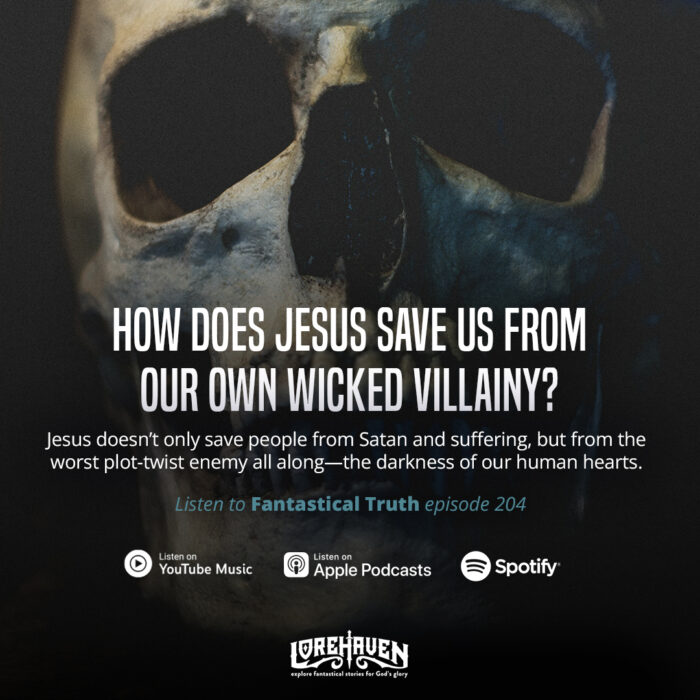204. How Does Jesus Save Us From Our Own Wicked Villainy?
Podcast: Play in new window | Download (Duration: 1:12:05 — 67.3MB) | Embed
When our hero Jesus died to atone for sin and resurrected Himself, He did not defeat only the Devil.1 He did this to “deliver all those who through fear of death were subject to lifelong slavery,” says the author of Hebrews. Jesus our hero is “a merciful and faithful high priest in the service of God, to make propitiation for the sins of the people.” He saves us from our own villainy!
Episode sponsors
- Enclave Publishing: Hybrid by Candace Kade
- Changelings: Insurgence by Liam Corley
- Realm Makers: 2024 writers conference
Mission update
- This week we debut a new article from author Jasmine Fischer.
- Subscribe free to get updates and join the Lorehaven Guild.
Concession stand
- This is part of our series He Saves Us, about the foes Jesus defeats.
- These include not just human villainy (today) but Satan and suffering.
- At different times of your life, you may resonate with one or the other.
- Maybe you feel spiritual attack, or the thorns and thistles of suffering.
- Yet at all times we feel our fight against sin from which He saves us.
- Finally, many Christians re. salvation put on their “evangelism” filter.
- But this episode isn’t mainly for the nonbelievers. It’s a family review.
- That’s why we use initials like “PSA,” for penal substitutionary atonement.
Quotes and notes
The penal substitutionary view of the atonement holds that the most fundamental event of the atonement is that Jesus Christ took the full punishment that we deserved for our sins as a substitute in our place, and that all other benefits or results of the atonement find their anchor in this truth.2
[Jesus speaking] “For this reason the Father loves me, because I lay down my life that I may take it up again. No one takes it from me, but I lay it down of my own accord. I have authority to lay it down, and I have authority to take it up again. This charge I have received from my Father.”
John 10:17–18
Therefore you have no excuse, O man, every one of you who judges. For in passing judgment on another you condemn yourself, because you, the judge, practice the very same things. We know that the judgment of God rightly falls on those who practice such things. Do you suppose, O man—you who judge those who practice such things and yet do them yourself—that you will escape the judgment of God? Or do you presume on the riches of his kindness and forbearance and patience, not knowing that God’s kindness is meant to lead you to repentance? But because of your hard and impenitent heart you are storing up wrath for yourself on the day of wrath when God’s righteous judgment will be revealed.
Romans 2:1–5
For surely it is not angels that [Jesus] helps, but he helps the offspring of Abraham. Therefore he had to be made like his brothers in every respect, so that he might become a merciful and faithful high priest in the service of God, to make propitiation for the sins of the people.
Hebrews 2:16–17
1. Many people like to say: we are basically good.
- You ever been at that party or event that’s mainly about other people?
- In other words, most of what people have in common is their mutuals.
- Did you hear about him? Did you see what she shared on her platform?
- The in-group becomes “people in this room,” with others being “out.”
- The “good guys” become you and your friends, who aren’t bad.
- But what happens at another event, with a new mix of people?
- The pretend “good guys” and “bad guys” swap roles based on nothing.
- So it is when people act like “we are” or “I am” basically good inside.
- If we sin, there’s an excuse. Other people. The system. Or even trauma.
- Before we speak of corrections to this, why do we share this false “story”?
2. But people also like to say: everyone else is evil!
- Everyone outside the party is full of drama, foolishness, clout-chasing.
- They are corrupt; their deeds are vile. Because they’re not with us now.
- And when others further out sin, there’s even less of an excuse.
- Further outside our “party,” those people are oppressors. Careless. Evil.
- Why do we like to carry on with this kind of constant self-delusion?
- It doesn’t make sense. It’s not thoughtful. At best it’s mindless small talk.
- Small talk isn’t enough for big ideas about human will and responsibility.
- Fiction flushes this out. Any good-vs.-evil story must be taken seriously.
- Unless, of course, you make some stories into “small talk.” Then they fail.
3. Jesus says: Everyone is evil, but I save my people.
- Now we come to some very hard, even “grimdark” biblical proofs.
- Humans are, by nature, evil. Some even say “dead in” or enslaved to sin.
- That’s the language of the apostle Paul in Ephesians 2. No escape clause.
- Before we talk about Satan, or suffering, we need to emphasize sin.
- This is a terminal heart-level condition. All the older preachers are right.
- We’re not at all perfect spiritual creatures like the angels of heaven.
- We’re not the heroes of the story, teamed up with Jesus versus the Devil.
- We’re not the heroes who fight our own tragic backstories and trauma.
- Instead, we’re the villains. We need the redemption arcs. He’s the Hero.
Com station
Top question for listeners
- Do you tend to imagine Jesus saving us mainly from that dragon Satan, our own human sin, or suffering and death?
Next on Fantastical Truth
Sin doesn’t ruin human lives and all the creation by itself. Sin brings the consequence of suffering. Hebrews 2:18 promises, “For because [Jesus] himself has suffered when tempted, he is able to help those who are being tempted.” Next week we’re joined by a special guest who explores real suffering, memory, and healing in the worlds of fiction: novelist J. J. Fischer.
- Photo by Michael Förtsch on Unsplash. ↩
- “Substutionary Atonement,” Thomas Schreiner, undated essay at The Gospel Coalition. ↩







































